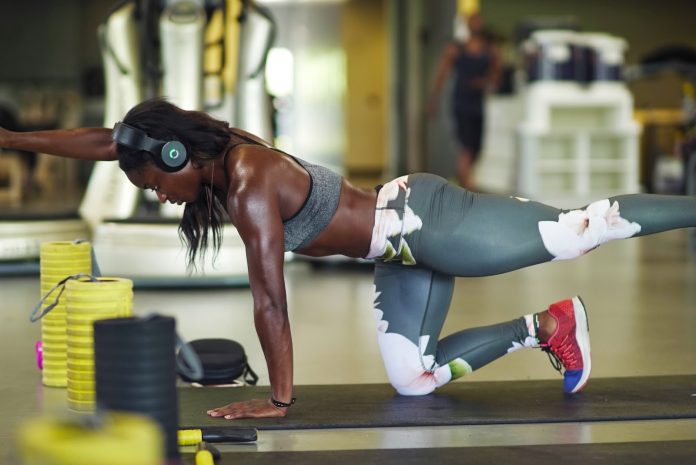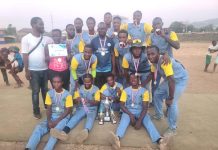It’s another day at the track, and sprinter Hafstau Kamara of Sierra Leone has only one thing on her mind: becoming the first female from her country to medal in a major track and field competition. As Sierra Leone’s fastest female sprinter (in 100m and 200m), she’s made immense strides towards making that dream a reality.
Most recently, her lifetime commitment to track earned her a ticket to the Rio Olympics, where she became the first-ever Sierra Leonean athlete to advance beyond the preliminaries in any event. She now has her sights set on Tokyo 2020 and beyond, as her debut performance in Rio gave her the experience and insight she needed to compete on the world’s biggest stage.
Armed with a tireless work ethic and her Halo Sport headset (and a little motivation from her favorite R&B anthems), she’s determined to make a mark on her country’s history. Here’s a look at how Hafsatu got to where she is today, how she stays on top of her rigorous training and Neuropriming schedule, and why in the future there appears to be no stopping her.
The beginning: Hafsatu rediscovers the muscle memory she built in childhood
“I don’t remember it, but my grandparents have pictures of me in the Sierra Leone National Stadium, in my track clothes and my little sneakers.”
Hafsatu (her friends call her “Hafsa”) first started running track as a child while living with her grandparents in Sierra Leone, but didn’t return to the sport until high school. When she started running again, she thought she was trying a completely new sport, but she was a natural from the start. Without even realizing it, Hafsa had uncovered a fundamental truth about training: that repetition induces lasting motor learning in the motor cortex of the brain — a mechanism Halo Sport draws on to accelerate improvements in performance when paired with training.
The inspiration: Hafsatu learns to work towards unlocking her potential
“My most inspirational coach was the type that would pull that potential out of you — no matter what. He showed me the potential I had to go further in the sport.”
The first lesson Hafsa needed to learn when starting out was how to push herself towards her goals. She first learned this from her track coach: Coach Carmichael. Carmichael taught Hafsa that talent alone wasn’t enough — that she was going to have to work hard to reach her full potential.
Hafsa fully internalized her coach’s invaluable message, which resonated particularly strong with her, as hard work was what allowed her family to build a new life after immigrating from Sierra Leone. Her track journal proudly displays a cover reading: “You have the key to unlock your potential.” Attitudes like Hafsa’s are the inspiration behind Halo Sport: by combining talent, hard work, and training smart, we believe that anyone can reach their full potential.
- Home
- News
- News
BHI’s Transformation of Kono: Empowering Women & Saving Lives
The Maternal Center of Excellence (MCOE), a newly constructed facility within the Koidu Government Hospital in Kono, stands as a groundbreaking achievement in Sierra...News“225 Keeps Us Going…” Tramadol Abuse Amongst Youth Raises National Alarm
By sahr Ibrahim Komba “225 is now a part of my daily meal. I cannot go a day or even ride my bike without taking...CrimeIn the quest for greener pastures…Young Sierra Leoneans Caught in the web of Human trafficking
By Sahr Ibrahim Komba Late last year Justice Momoh-Jah Stevens sentenced one Prince Osman Bangura to 165 years in prison for trafficking and sexually abusing...NewsCorruption in Blue Uniform: Passengers pay the price.
By Sahr Ibrahim Komba Every day, thousands of people in Sierra Leone leave their homes to hustle for a better life whether it's to get...NewsToothless Pharmacy Board Fails to Combat Drug Peddling
By Sahr Ibrahim Komba The rampant proliferation of drug peddling across Sierra Leone has escalated into a pressing public health crisis, underscoring the urgent need...
- Politics
- News
Politicians Are Forcing Public Servants To Become Politicians
Deputy Majority Whip 2 Hon Ibrahim Tawa Conteh of Western Area Urban has said that it is the politicians who are forcing public servants...NewsRelease Detainees Arrested For Elections-Related Issues! …APC’s Alfred Thompson Calls
Hon Alfred Ayodele Thompson of Western Area has called on the president Bio to release all the people that were arrested with regards elections...News“Monkey Wok, Baboon Chop…” SLPP GRASSROOTS ACCUSES BIO OF BETRAYAL
Following the appointment of cabinet positions and other appointments by President Julius Maada Bio, several grassroots supporters of the ruling Sierra Leone People Party...NewsAS DENINS SANDY RESURFACES… ALPHA TIMBO, FODAY YUMKELLA, KABINNEH KALLON, LAHAI LEAMA OTHERS KICKED OUT!
Following the first set of cabinet minister appointed by President Julius Maada Bio, the President has also announced the remaining cabinet positions which saw...NewsCITIZENS CALL ON APC TO PARTICIPATE IN GOVERNANCE PROCESSES
Citizens called on the All Peoples Congress to take active part in the governance processes of the state and reverse its decision on nonparticipation...
- Commentary
- Commentary
THE CABINET IS FINALLY OUT OF THE CABINET: NOW WHAT?
PONDER MY THOUGHTS: By Andrew Keili Many have been waiting with bated breath to see whether President Bio would match his rhetoric of dramatic change...CommentaryIOD (SL): ONBOARDING BOARDS FOR GOOD CORPORATE GOVERNANCE IN SL
By Andrew Keili I was recently priviledged to chair the launching of the newly formed Institute of Directors (Sierra Leone)-IOD (SL) at the New Brookfields...CommentaryPONDER MY THOUGHTS… THE CHURCH IN SL: GROWING OR DYING?
(Guest writer -Dr. Modupe Taylor-Pearce) By Andrew Keili As we reflect on the meaning of Easter this season, it behoves us to examine how well we have...CommentaryCRSG is the Reliable Partner For Development
China Railway Seventh Group (CRSG) started to serve Sierra Leone in construction area from 2007. The last sixteen years have witnessed CRSG’s commitment to...CommentaryONLY IN SALONE
COFFIN WITHOUT A BODY How can an empty coffin be taken for burial? Well, it happened in Ashobi corner, according to a newspaper report titled...
- Religion
- News
Harvest Intercontinental Ministries Exists In Thirty Nations
The head of Bethel World Outreach Ministries International, now Harvest Intercontinental Ministries Unlimited, Rev. Julius Laggah has disclosed that the ministries has been in...ReligionHarvest Intercontinental Ministries Exists In Thirty Nations
The head of Bethel World Outreach Ministries International, now Harvest Intercontinental Ministries Unlimited, Rev. Julius Laggah has disclosed that the ministries has been in...
- Sports
- Sports
Leone Rock Premier League: Relegation Battle Intensifies for Four Big Clubs
After 10 matches in the Leone Rock Premier League, four of Sierra Leone’s biggest football clubs find themselves battling in the relegation zone. These...SportsSpecial Line Retains Premier League Champion Trophy Using Special Skills, Says Manager Philip
Special Line CC, the defending champions of the Cricket Sierra Leone Premier League, defeated SL Police Senior Men’s CC by 23 runs in the...SportsWill Mohamed Kallon Include Musa and Kemokai Kallon in the Leone Stars Technical Team?
Mohamed Kallon has officially been appointed as the new head coach of Sierra Leone’s national football team, the Leone Stars, as confirmed by the...SportsCAF U-20 AFCON: Shooting Stars Coach Optimistic About World Cup Qualification
Sierra Leone's national U-20 football team, known as the Shooting Stars, has been drawn into Group C for the 2025 CAF U-20 Africa Cup...SportsAhmed Khanu Replaces Joseph Nyande as NOC Secretary General
The Executive Board of the National Olympic Committee and the Commonwealth Games Association in Sierra Leone (NOC/CGA SLE) has appointed Ahmed Khanu as the...
- Entertainment
- Advert
- Advert
Movement for Assistance and Promotion of Rural Communities in Sierra Leone (MAPCO) Advertisement
INVITATION FOR BIDS (IFB) NATIONAL COMPETITIVE BIDDING (NCB) PROJECT TITLE: Strengthening CSOs as inclusive actors of good governance and development in Sierra Leone PROCUREMENT NUMBER/BID REF. No.:...AdvertJOB ADVERTISEMENT – FOURAH BAY COLLEGE
JOB ADVERTISEMENT FOURAH BAY COLLEGE - UNIVERSITY OF SIERRA LEONE Fourah Bay College, University of Sierra Leone is interested in recruiting qualified Sierra Leonean to fill...AdvertUBA Sierra Leone Records Outstanding Performance in 2022 Financial Year
Highlights: Income Statement 64% Year on Year (YoY) growth in Gross Earning to SLE427 million from SLE 260 million in 2021. 71% YoY Growth in...AdvertCouncil of Churches in Sierra Leone (CCSL)
1 Terms of Reference for Project Evaluation Key Project Information Name of project being evaluated: Enhancing the Capacity of the Council of Churches...AdvertVACANCY ANNOUNCEMENT – IFRC
The International Federation of the Red Cross and Red Crescent Societies (IFRC) on behalf of the Finnish Red Cross is looking for a qualified...
- More
Breaking news
- Home
- News
- News
BHI’s Transformation of Kono: Empowering Women & Saving Lives
The Maternal Center of Excellence (MCOE), a newly constructed facility within the Koidu Government Hospital in Kono, stands as a groundbreaking achievement in Sierra...News“225 Keeps Us Going…” Tramadol Abuse Amongst Youth Raises National Alarm
By sahr Ibrahim Komba “225 is now a part of my daily meal. I cannot go a day or even ride my bike without taking...CrimeIn the quest for greener pastures…Young Sierra Leoneans Caught in the web of Human trafficking
By Sahr Ibrahim Komba Late last year Justice Momoh-Jah Stevens sentenced one Prince Osman Bangura to 165 years in prison for trafficking and sexually abusing...NewsCorruption in Blue Uniform: Passengers pay the price.
By Sahr Ibrahim Komba Every day, thousands of people in Sierra Leone leave their homes to hustle for a better life whether it's to get...NewsToothless Pharmacy Board Fails to Combat Drug Peddling
By Sahr Ibrahim Komba The rampant proliferation of drug peddling across Sierra Leone has escalated into a pressing public health crisis, underscoring the urgent need...
- Politics
- News
Politicians Are Forcing Public Servants To Become Politicians
Deputy Majority Whip 2 Hon Ibrahim Tawa Conteh of Western Area Urban has said that it is the politicians who are forcing public servants...NewsRelease Detainees Arrested For Elections-Related Issues! …APC’s Alfred Thompson Calls
Hon Alfred Ayodele Thompson of Western Area has called on the president Bio to release all the people that were arrested with regards elections...News“Monkey Wok, Baboon Chop…” SLPP GRASSROOTS ACCUSES BIO OF BETRAYAL
Following the appointment of cabinet positions and other appointments by President Julius Maada Bio, several grassroots supporters of the ruling Sierra Leone People Party...NewsAS DENINS SANDY RESURFACES… ALPHA TIMBO, FODAY YUMKELLA, KABINNEH KALLON, LAHAI LEAMA OTHERS KICKED OUT!
Following the first set of cabinet minister appointed by President Julius Maada Bio, the President has also announced the remaining cabinet positions which saw...NewsCITIZENS CALL ON APC TO PARTICIPATE IN GOVERNANCE PROCESSES
Citizens called on the All Peoples Congress to take active part in the governance processes of the state and reverse its decision on nonparticipation...
- Commentary
- Commentary
THE CABINET IS FINALLY OUT OF THE CABINET: NOW WHAT?
PONDER MY THOUGHTS: By Andrew Keili Many have been waiting with bated breath to see whether President Bio would match his rhetoric of dramatic change...CommentaryIOD (SL): ONBOARDING BOARDS FOR GOOD CORPORATE GOVERNANCE IN SL
By Andrew Keili I was recently priviledged to chair the launching of the newly formed Institute of Directors (Sierra Leone)-IOD (SL) at the New Brookfields...CommentaryPONDER MY THOUGHTS… THE CHURCH IN SL: GROWING OR DYING?
(Guest writer -Dr. Modupe Taylor-Pearce) By Andrew Keili As we reflect on the meaning of Easter this season, it behoves us to examine how well we have...CommentaryCRSG is the Reliable Partner For Development
China Railway Seventh Group (CRSG) started to serve Sierra Leone in construction area from 2007. The last sixteen years have witnessed CRSG’s commitment to...CommentaryONLY IN SALONE
COFFIN WITHOUT A BODY How can an empty coffin be taken for burial? Well, it happened in Ashobi corner, according to a newspaper report titled...
- Religion
- News
Harvest Intercontinental Ministries Exists In Thirty Nations
The head of Bethel World Outreach Ministries International, now Harvest Intercontinental Ministries Unlimited, Rev. Julius Laggah has disclosed that the ministries has been in...ReligionHarvest Intercontinental Ministries Exists In Thirty Nations
The head of Bethel World Outreach Ministries International, now Harvest Intercontinental Ministries Unlimited, Rev. Julius Laggah has disclosed that the ministries has been in...
- Sports
- Sports
Leone Rock Premier League: Relegation Battle Intensifies for Four Big Clubs
After 10 matches in the Leone Rock Premier League, four of Sierra Leone’s biggest football clubs find themselves battling in the relegation zone. These...SportsSpecial Line Retains Premier League Champion Trophy Using Special Skills, Says Manager Philip
Special Line CC, the defending champions of the Cricket Sierra Leone Premier League, defeated SL Police Senior Men’s CC by 23 runs in the...SportsWill Mohamed Kallon Include Musa and Kemokai Kallon in the Leone Stars Technical Team?
Mohamed Kallon has officially been appointed as the new head coach of Sierra Leone’s national football team, the Leone Stars, as confirmed by the...SportsCAF U-20 AFCON: Shooting Stars Coach Optimistic About World Cup Qualification
Sierra Leone's national U-20 football team, known as the Shooting Stars, has been drawn into Group C for the 2025 CAF U-20 Africa Cup...SportsAhmed Khanu Replaces Joseph Nyande as NOC Secretary General
The Executive Board of the National Olympic Committee and the Commonwealth Games Association in Sierra Leone (NOC/CGA SLE) has appointed Ahmed Khanu as the...
- Entertainment
- Advert
- Advert
Movement for Assistance and Promotion of Rural Communities in Sierra Leone (MAPCO) Advertisement
INVITATION FOR BIDS (IFB) NATIONAL COMPETITIVE BIDDING (NCB) PROJECT TITLE: Strengthening CSOs as inclusive actors of good governance and development in Sierra Leone PROCUREMENT NUMBER/BID REF. No.:...AdvertJOB ADVERTISEMENT – FOURAH BAY COLLEGE
JOB ADVERTISEMENT FOURAH BAY COLLEGE - UNIVERSITY OF SIERRA LEONE Fourah Bay College, University of Sierra Leone is interested in recruiting qualified Sierra Leonean to fill...AdvertUBA Sierra Leone Records Outstanding Performance in 2022 Financial Year
Highlights: Income Statement 64% Year on Year (YoY) growth in Gross Earning to SLE427 million from SLE 260 million in 2021. 71% YoY Growth in...AdvertCouncil of Churches in Sierra Leone (CCSL)
1 Terms of Reference for Project Evaluation Key Project Information Name of project being evaluated: Enhancing the Capacity of the Council of Churches...AdvertVACANCY ANNOUNCEMENT – IFRC
The International Federation of the Red Cross and Red Crescent Societies (IFRC) on behalf of the Finnish Red Cross is looking for a qualified...
- More
Editors Pick
News
“225 Keeps Us Going…” Tramadol Abuse Amongst Youth Raises National Alarm
By sahr Ibrahim Komba
“225 is now a part of my daily meal. I cannot go a day or even ride my bike without taking...
Crime
In the quest for greener pastures…Young Sierra Leoneans Caught in the web of Human trafficking
By Sahr Ibrahim Komba
Late last year Justice Momoh-Jah Stevens sentenced one Prince Osman Bangura to 165 years in prison for trafficking and sexually abusing...
News
Corruption in Blue Uniform: Passengers pay the price.
By Sahr Ibrahim Komba
Every day, thousands of people in Sierra Leone leave their homes to hustle for a better life whether it's to get...
Most read
News
“225 Keeps Us Going…” Tramadol Abuse Amongst Youth Raises National Alarm
By sahr Ibrahim Komba
“225 is now a part of my daily meal. I cannot go a day or even ride my bike without taking...
Crime
In the quest for greener pastures…Young Sierra Leoneans Caught in the web of Human trafficking
By Sahr Ibrahim Komba
Late last year Justice Momoh-Jah Stevens sentenced one Prince Osman Bangura to 165 years in prison for trafficking and sexually abusing...
News
Corruption in Blue Uniform: Passengers pay the price.
By Sahr Ibrahim Komba
Every day, thousands of people in Sierra Leone leave their homes to hustle for a better life whether it's to get...





